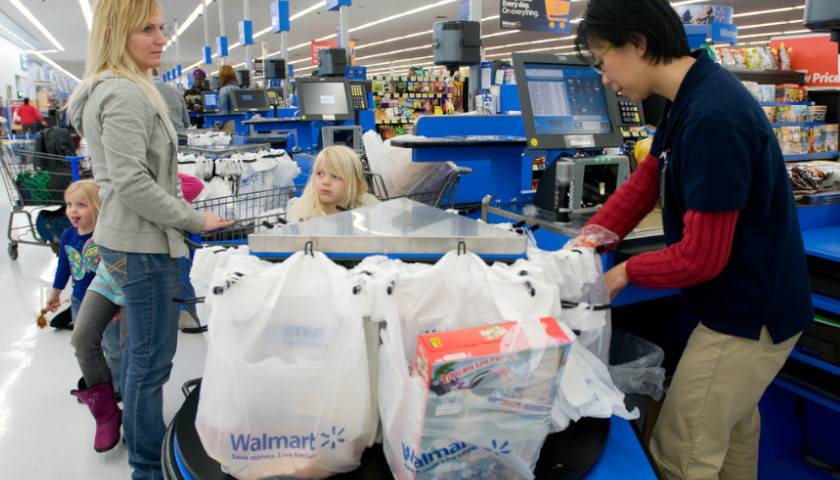by Kenneth Schrupp
According to a new analysis from the Los Angeles Times, California’s ban on thin plastic bags is a failure, as thicker, “recyclable” replacement bags are largely unable to be recycled in California, and the majority of consumers still opt not to bring their own bags to reuse for shopping.
Additional analyses have also found increases in purchases of plastic trash bags chip away at the plastics savings from single-use plastic bag bans, the pounds of plastic bags per-capita placed in landfills has increased since the ban, and many of the alternatives to single-use plastic bags typically end up being worse for the environment. Nonetheless, a major decrease in grocery bag litter suggests at least a partial success.
Of 514 customers observed in coastal, wealthy Culver City by the Los Angeles Times, 319 customers walked out of the store using a bag of some kind, while the rest left with single items that would not make sense to bag, such as 12-packs of soda or disposable cups for drinks sold in-store. Of those 319 customers, 216 used all-new plastic bags purchased at the store, 95 used sturdier, reusable bags, while only 8 reused plastic bags. Meanwhile at a Smart and Final and Grocery Outlet in Fresno, of the 35 observed shoppers who used bags, 34 emerged with new plastic bags, while just one person used a reusable bag.
California first adopted its single-use plastic bag ban in 2014, making it the first state in the country to do so. Plastic bags are cited by the Ocean Conservancy as one of the most common pieces of trash in the ocean, and because the polyethylene used in single-use, difficult-to-recycle plastic bags breaks down in just 20 years, 79 percent of marine microplastics are polyethylene. As these microplastics are ingested by animals and move up the food chain, they induce significant endocrine disruption, creating health complications, as they eventually make their way into the human food supply. One year after California’s adoption of the single-use plastic bag ban, there was a 72% decrease in grocery bag litter, suggesting that, regardless of the total likely increase in plastics use resulting from the ban, that the newer bags are being disposed of more responsibly.
As a result of the ban, grocery stores began charging ten cents per bag, and using thicker polyethylene bags that use twice as much plastic but are strong enough to be reused. Deeper analysis of California bag use by Dr. Rebecca Taylor at the University of Sydney, however, has found that individuals tend to reuse their plastic grocery bags only once, as liners for smaller trash cans, and that the elimination of 40 million pounds of plastic single-use bags was offset by an increase of 12 million pounds of increased purchases of designated trash bag purchases.
Furthermore, the thicker plastic bags now sold in grocery stores as recyclable and reusable are difficult to recycle, use twice as much plastic, and have to go to special recycling facilities. In their analysis, the Los Angeles Times did not find a single recycling center in the state that accepted these bags for recycling. As a result, while the amount of bags collected in cleanups has decreased significantly, the amount of plastic placed into landfills has increased; in 2004, the state government found Californians disposed of roughly eight pounds of plastic bags per person, but by 2021, that number had risen to 11 pounds of bags per person.
While there are special receptacles at grocery stores that supposedly allow for these thicker bags to be recycled, an investigation by the Last Beach Cleanup found of 15 trackers deployed in plastic bag recycling receptacles around Southern California, eleven went to landfills, one to the trash incinerator, one in the Port of Los Angeles, and two more in Mexico, suggesting the latter three were likely en route to Asia.
Common alternatives to these plastic bags such as canvas come with caveats of their own, with some critics suggesting that thinner, single-use bags properly disposed of may be one of the less harmful options currently available.
“In terms of environmental impacts on the climate side, [single-use] bags are quite efficient compared to thicker plastic or paper bags, and significantly more efficient than cotton tote bags that are hundreds of single use plastic bags’ worth of emissions,” said Ethan Brown, environmental expert and founder and host of PBS-affiliated environmental information podcast the Sweaty Penguin in an interview with The Center Square. “While plastic as a whole is a big issue, specifically targeting that kind of plastic bag in that way may not be having the desired outcome.”
– – –
Kenneth Schrupp is a reporter at The Center Square.
Photo “WalMart Checkout” by WalMart CC2.0.




